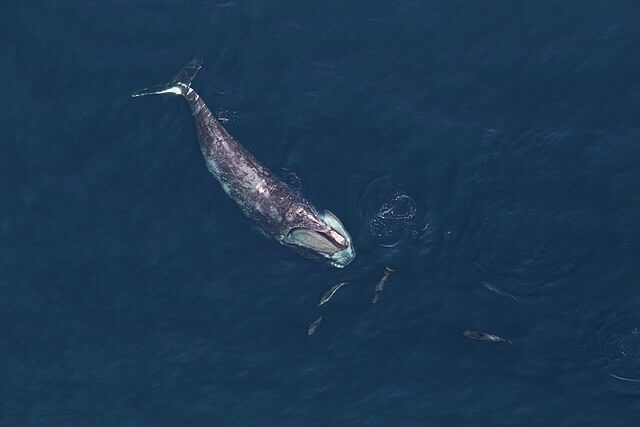
A new report highlights the endangerment of critically endangered North Atlantic right whales due to vessels exceeding speed limits in designated “slow zones.”
With only approximately 340 individuals remaining, collisions with ships pose a significant threat to these whales, as they often swim near the surface, and their dark coloration makes them challenging to detect.
In 2008, the National Oceanic and Atmospheric Administration in the US implemented a speed rule mandating that vessels 65 feet or longer must not exceed 10 knots in specified zones known as seasonal management areas along the US east coast to safeguard the whales.
However, a report by the conservation group Oceana reveals that vessels, ranging from cargo ships to luxury yachts, frequently surpass the speed limit, with some recorded at over three times the specified rate.
“Speeding boats can and do kill North Atlantic right whales,” said Gib Brogan, campaign director for Oceana. “Well-enforced speed zones are the most effective way to protect whales from this known threat.
“Slow zones are comparable to school slow zones to protect children – they act as required speed limits to offer protection from boat strikes where North Atlantic right whales are found.”
The study, covering boat speeds from November 2020 to July 2022 in slow zones along the US east coast, indicates that 84% of vessels violated the speed regulations, with cargo ships being the primary culprits, accounting for up to half of all speeding vessels.
The North Atlantic right whales’ sole known calving grounds are off the waters of Florida, Georgia, and South Carolina. Collisions with boats can lead to injuries or fatalities due to blunt-force trauma or propeller cuts, and entanglement in fishing gear is another major cause of death.
Since 2017, there have been 18 recorded boat strikes involving North Atlantic right whales in the US and Canada, resulting in 12 fatalities, although the actual number is likely higher. Research indicates that restricting boat speeds to 10 knots can reduce the risk of death by 80% to 90%.
“We need stronger safeguards and more enforcement to give these critically endangered whales the protection they need,” Brogan said. “If US and Canadian leaders increase protections for North Atlantic right whales from known threats, scientists tell us that the species can and will come back from the brink of extinction.”
——————————————————————————
At Natural World Fund, we are passionate about stopping the decline in our wildlife.
The decline in our wildlife is shocking and frightening. Without much more support, many of the animals we know and love will continue in their decline towards extinction.
When you help to restore a patch of degraded land through rewilding to forests, meadows, or wetlands, you have a massive impact on the biodiversity at a local level. You give animals a home and food that they otherwise would not have had, and it has a positive snowball effect on the food chain.
We are convinced that this is much better for the UK than growing lots of fast-growing coniferous trees, solely to remove carbon, that don’t actually help our animals to thrive.
This is why we stand for restoring nature in the UK through responsible rewilding. For us, it is the right thing to do. Let’s do what’s right for nature!
Donate today at https://naturalworldfund.com/ and join in the solution!

